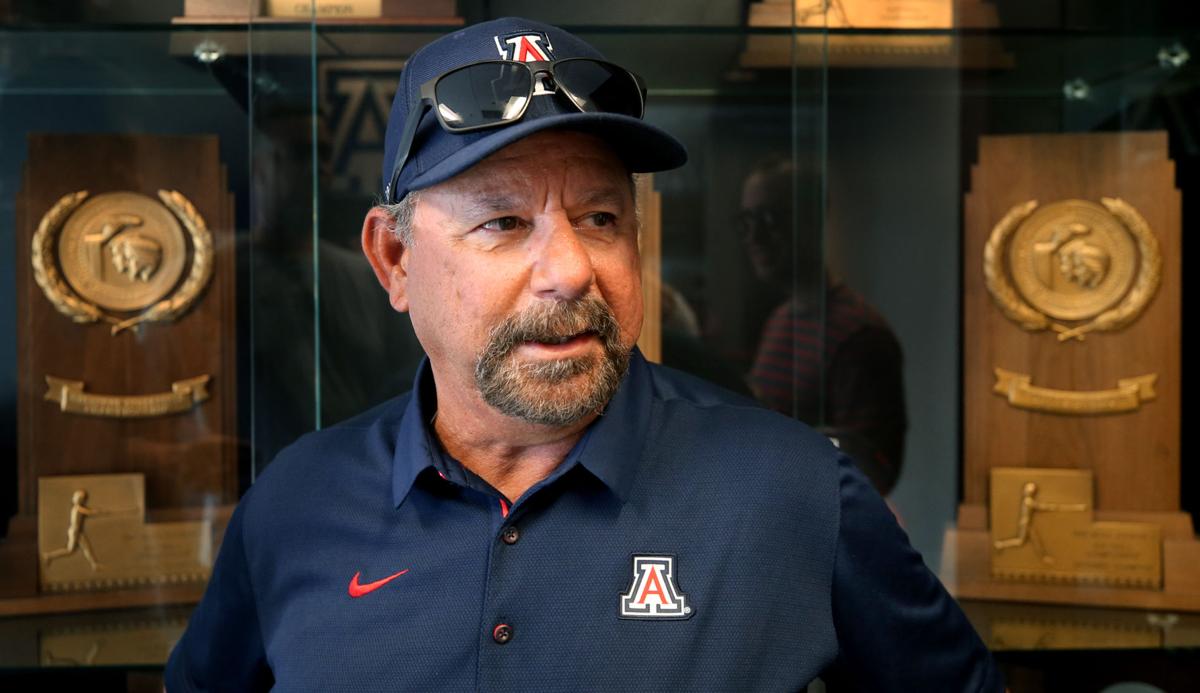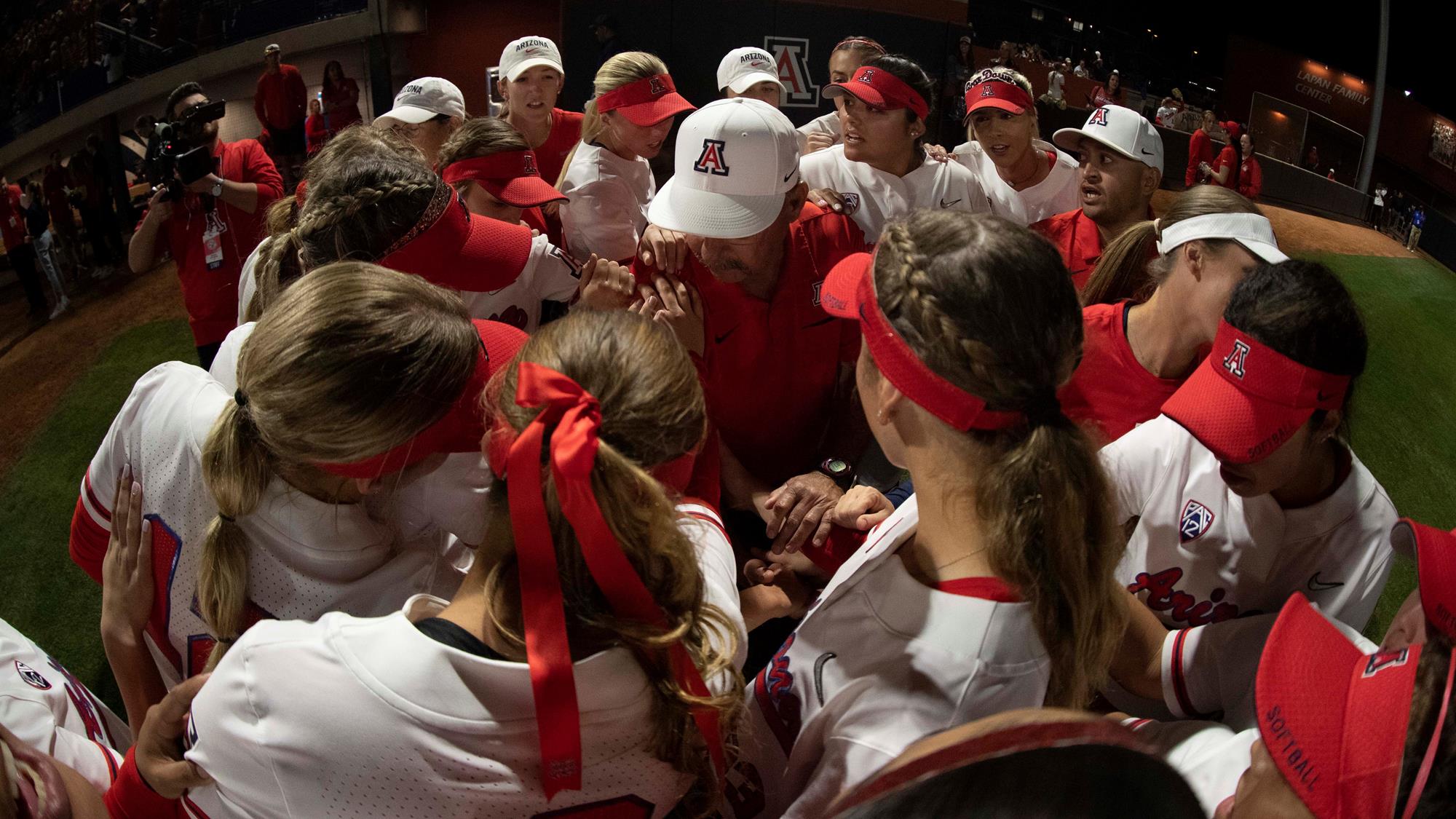College Softball Legend Honored at Arizona
TUCSON, Ariz. – Everyone knew it was just a matter of time, but officials at the University of Arizona wasted little time in assuring Mike Candrea’s name will forever be remembered at the school.
Not like his name would have ever been forgotten considering the way he put softball at the school on the map and how he has long been one of the forces behind the growth in popularity of the sport across the nation.
Arizona honored Candrea on Jan. 29 at halftime of its men’s basketball game against rival Arizona State. The school also announced that the field at will be named Mike Candrea Field at Rita Hillenbrand Stadium when the Wildcats begin the 2022 season.
Arizona is scheduled to open the season Feb. 11 by taking on Southern Utah at the Candrea Classic in Tucson.
The tribute and announcement of the naming of the field comes less than one year after Candrea stepped down as coach of the Wildcats after 36 seasons leading the Arizona program from relative obscurity to one of the benchmarks of the college game.
He is the winningest coach in NCAA softball history with 1,674 wins and only three coaches have won more games – in any sport – in NCAA history.
Candrea’s mark is expected to be surpassed early this season as current Michigan coach Carol Hutchins, who is her 38th year at the helm of the Wolverine program, heads into the new season with a career mark of 1,669 wins in her career and needs just six wins to surpass Candrea as the all-time wins leader.
The decision to step away from his life’s work had been in the place for some time, according to Candrea, who, like many other college coaches, pointed to the changing landscape of college sports with the recent implementation of the Name, Like and Image (NIL) ruling and the explosion of the transfer portal, as playing a part in his decision to retire.
“What we were able to build at Arizona surpassed all my imaginations when I took the job,” he said. “I am grateful for what we accomplished … but it was just time that I step back and enjoy life a little.”
He said he plans on spending a little bit of time on some of the many golf courses the Tucson area is famous for.

BEFORE ARIZONA
Candrea was born in New Orleans and move with his family to Phoenix at age seven.
He later attended Sunnyslope High School, located in the shadows of a mountain with the letter “S” proudly celebrating the neighborhood in north Phoenix. He went on to attend Central Arizona College and obtained an associate degree from the school in 1975 before going on to earn his bachelor’s degree from Arizona State in 1978.
An elbow injury while at CAC cut short his playing career.
“I had Tommy John surgery before there was Tommy John surgery,” Candrea quipped.
While an undergraduate at ASU, he served as an assistant baseball coach at CAC and continued in that role through the 1980 season.

A short time later he was asked to coach the women’s softball team at Central Arizona by the school’s athletics director, George Young, a legendary sports figure in his own right.
After competing in four Olympics in track, earning a bronze medal in the steeplechase at the 1968 Olympic Games in Mexico City, and establishing a number of American records throughout his career, Young began coaching at CAC. And he did it all at the school.
Young coached seven different sports and led his teams to a total of fourteen championships, including the 1988 junior college national title in cross country.
“I was always a baseball guy and I knew nothing about softball,” Candrea said. “To me, softball was just a game you played when you couldn’t play baseball.”
Young was persuasive and Candrea unknowingly embarked on a career unmatched in softball.
Coaching a junior college softball program in the desert was not without its challenges, Candrea recalled.
“There were a lot of challenges and they seemed to all hit me between the eyes after taking the job,” he said. “The weather can be unpredictable,” he added, remembering the monsoons that seem to pop up with little notice during the spring in the deserts surrounding Phoenix.
“We also had to wait until the PE classes were off the field before we could drag it to have practice,” added Candrea, who was paid $99 every two weeks as coach and leader of the grounds crew at the school.
Despite the challenges, Candrea’s coaching skill became readily apparent when he guided the Vaqueras the NJCAA Softball Tournament and thus winning the school a National Championship.
/cloudfront-us-east-1.images.arcpublishing.com/gray/W7KTKTKLCBEPRHINULIMLYLOLE.jpg)
ARIZONA
After four years as coach at CAC, Candrea moved downstate to Tucson and took over the Wildcat program in time for the 1986 season.
The school, like many other institutions were still trying to find footing within their athletics programs after transitioning from being governed by the Association of Intercollegiate Athletics for Women (AIAW) to the NCAA, which had taken over control of most programs in 1982. The AIAW, which was formed in 1971, discontinued operations in 1983 after the two organizations overlapped governing in 1981-82.
Arizona finished 27-13-1 in Candrea’s first season at the school and that was just glimmer as to what would become a beacon across the nation. Over the rest of his time at the school the Wildcats would win no fewer than 33 games in a full season.
The 1987 season saw Arizona reach the NCAA postseason for the first time in what would be a streak that reached 24 consecutive appearances under his leadership. Along the way, the Wildcats competed in the Women’s College World Series 16 straight seasons (1988-2003).
Candrea and the Wildcats reached the pinnacle of the college softball world in 1991 when Arizona defeated UCLA 5-1 to win the WCWS for the first time in school history.
Arizona, which swept Arizona State in a regional tournament in Tempe to earn another trip to Oklahoma City, opened the WCWS by defeating UNLV 1-0 and downed UCLA by that same score to remain undefeated in the tournament. The Bruins had swept the Wildcats earlier in the season in a series in Los Angeles and the two teams split the return series in Tucson a month later.
Arizona moved onto the semifinal round of the 1991 WCWS with another 1-0 win, this time over Long Beach State before losing to Fresno State by, you guessed it, a 1-0 score to set up the rematch with the Bruins for the national title. UCLA had eliminated Fresno State 5-1 to advance to the championship game.
Debbie Day (pitcher) and Kristin Gauthier, along with infielders Julie Jones and Julie Standering, represented Arizona on the all-tournament team.
“We had a team made up of players primarily from Arizona,” Candrea recalled. “It wasn’t until then that players from other states began to really started looking at playing at Arizona.
The success that had been building in the UA program since Candrea’s arrival and culminating with the first national championship, helped spur the construction of Hillendbrand Stadium on the Arizona campus. The 2,956-seat stadium, considered one of the top collegiate softball stadiums in the nation, was completed in 1993 and since then Arizona has led the nation in attendance six times.
“It’s quite a blessing to have the kind of support that we have received from the Hillenbrand family over the years and from the community of Tucson,” Candrea said.
Arizona would go on to win seven more NCAA championships under Candrea’s leadership. The Wildcats won back-to-back crowns in 1993-94 and repeated that feat in 1996-97, and again in 2006-07. They also claimed the national title in 2001 to give Candrea a total of eight championships in his legendary career. The Wildcats also finished runner-up five times (1992-95-98-02-10) during his tenure at the school.
Candrea took a leave of absence from Arizona in 2004 to coach the U.S. Olympic team to a 5-1 win over Australia in the gold medal game. The U.S. squad outscored its opponents 51-1 in the Olympic tournament.
Larry Lady, the longtime assistant at Arizona under Candrea, took over on an interim basis in 2004. He also stepped in on an interim basis for a second time four years later when Candrea coached the Olympic team for a second and coming away with a silver medal after losing to Japan 3-1 in a bid to win the gold for a fourth consecutive time.
Candrea returned to the Wildcats after the 2004 Games and guided Arizona to a 45-12 overall record and another trip to the WCWS. His 2009 Wildcats finished 46-17 in his return following the 2008 Games.
Candrea won his 1,580th game of his career on March 5, 2019 when Arizona defeated. The win allowed him to tie longtime Michigan coach Carol Hutchins for the most wins in NCAA softball history. Just over a month later, Arizona defeated Stanford 9-1 to allow Candrea to become just the second coach to reach 1,600 wins, and the faster coach to achieve that lofty milestone.
Arizona won at least 50 games in a season 17 times during Candrea’s tenure as coach, including five seasons reached the 60-win plateau.
“Softball continues to grow across the country,” the newly retired coach said. “Above all else, as in any game that is, played, the athletes have gotten better. But can only be achieved by better support and better facilities.”
Candrea also likes the current setup of the WCWS being played annually at USA Softball Hall of Fame Stadium in Oklahoma City, where it has been held every year since 1996 with the exception of 1996. The tournament was held that year in Columbus, Ga. ahead of the Olympic Games which were held in nearby Atlanta just over one month later.
“It helps build an identity for the sport,” Candrea said of the current annual migration to Oklahoma City.
Candrea said the festivities in Tucson recently held to honor the iconic coach caught him by complete surprise.
“I am deeply honored to have the field named after me,” he said. “It’s a tribute to all the athletes, coaches and support staff that have worked with me over my career.
“It takes a village to make a successful career happen,” he added.
LOFTY NUMBERS
1,674 – Number of wins for Candrea during his illustrious career.
34 – Postseason berths while at Arizona.
22 – Arizona’s appearances in the WCWS under Candrea.
16 – Consecutive WCWS appearances (1988-03).
12 – WCWS championship appearances.
11 – The number of conference championships won by Candrea’s team while at Arizona.
10 – The number of conference coach of the year honors won by Candrea.
8 – The number of NCAA championships won by Arizona during Candrea’s tenure at the school.

A native of Bismarck, N.D., Ray is a graduate of North Dakota State University where he began studying athletic training and served as a student trainer for several Bison teams including swimming, wrestling and baseball and was a trainer at the 1979 NCAA national track and field championship meet at the University of Illinois. Ray later worked in the sports information office at NDSU. Following his graduation from NDSU he spent five years in the sports information office at Missouri Western State University and one year in the sports information at Georgia Tech. He has nearly 40 years of writing experience as a sports editor at several newspapers and has received numerous awards for his writing over the years. A noted sports historian, Ray is currently an assistant editor at Amateur Wrestling News.

